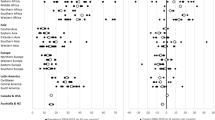Abstract.
Organized crime emerges out of the power vaccuum that is created by the absence of state enforcement, and which can have many sources: geographic, social, and ethnic distance, prohibition, or simply collapse of state institutions. Mafias and gangs are hierarchically organized and can be thought of as providing primitive state functions, with economic costs that are typically much higher than those associated with modern governance. Though organized crime cannot be completely eradicated, its control is necessary, since it can easily corrupt existing institutions of governance. Some thoughts on what can be done to control organized crime are offered.
Similar content being viewed by others
Author information
Authors and Affiliations
Rights and permissions
About this article
Cite this article
Skaperdas, S. The political economy of organized crime: providing protection when the state does not. Econ Gov 2, 173–202 (2001). https://doi.org/10.1007/PL00011026
Issue Date:
DOI: https://doi.org/10.1007/PL00011026



